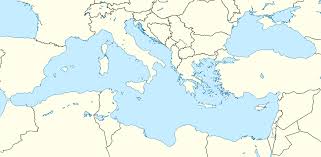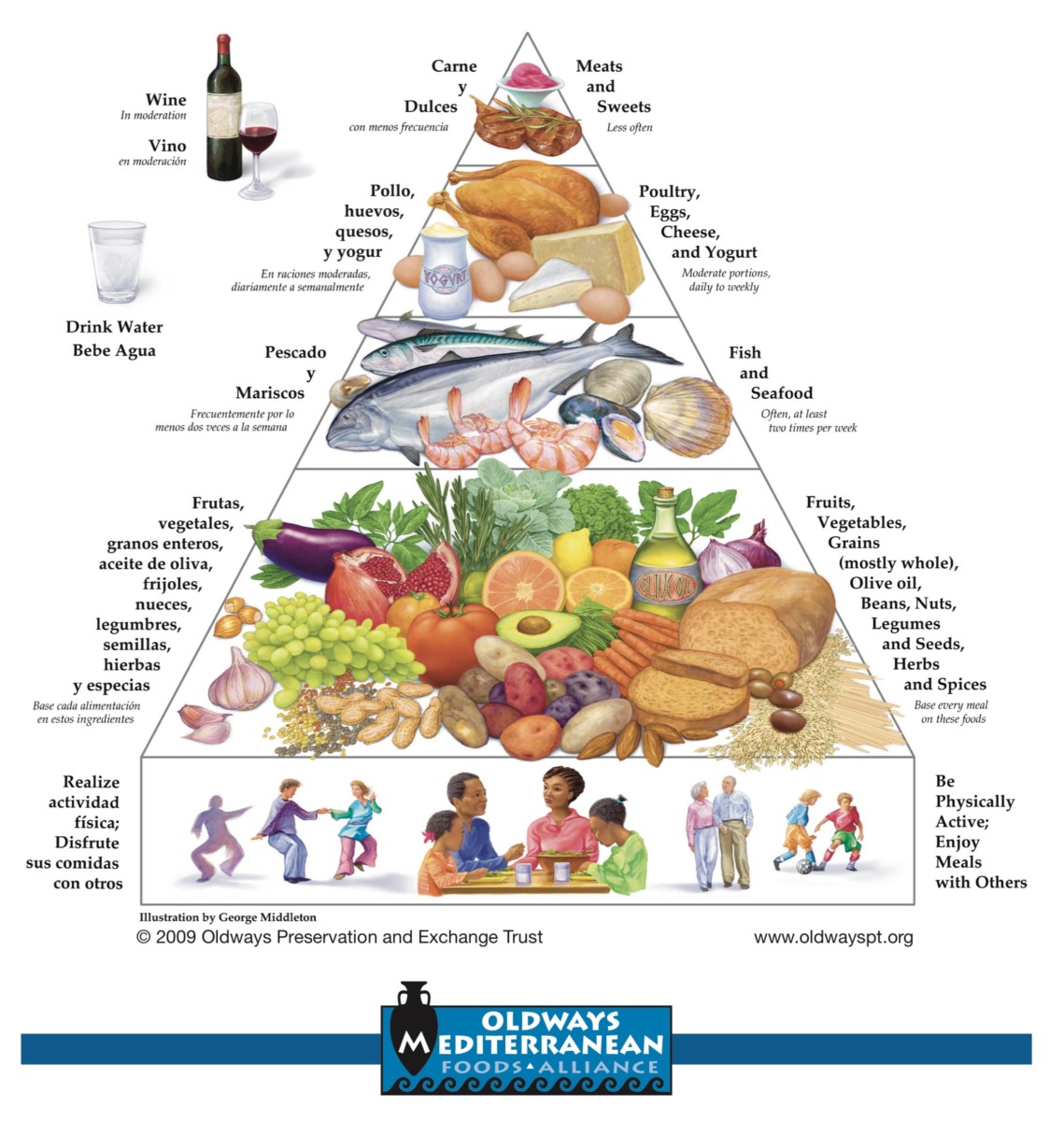Mediterranean Diet

Now that we can see the connection between a Mediterranean diet and a reduced incidence of major cardiovascular events, let’s take a closer look at what sets this eating plan apart. Common in countries such as Greece and Southern Italy, a Mediterranean diet is abundant in vegetables, fruits, whole grains and fish. Meats and sugary foods are eaten sparingly, and the diet is rich in nuts, legumes, olive oil and even a glass of red wine here and there. Real Mediterranean cuisine also can be found in the foods of Spain, provencal France, Turkey, Lebanon, Israel, Morocco and Tunisia. So very different tastes, from creamy and garlicky hummus to chewy calamari to sweet baklava can be part of a Mediterranean diet.

It is also helpful to think of the Mediterranean diet more as a Mediterranean “lifestyle.” Beyond food choices, Mediterranean cultures tend to emphasize the importance of healthy physical activity and low stress – factors that both tend to contribute to a lifetime of heart health!
A Closer Look at the Mediterranean Diet
Where Other Diets Fail, Eating Mediterranean Style Succeeds
- Eating lots of fresh vegetables, fruits and whole grains is great for your heart. Vegetables and fruit should fill half your plate; whole grains should fill one-quarter and one-quarter or less of your plate should be left for meat or fish.
- Olive oil and nuts are loaded with heart-healthy monounsaturated fat and are a important part
- Get most of your protein from fish, plant proteins, low-fat dairy and skinless poultry rather than red meat
- The more physically active you are, the more you can benefit from a Mediterranean Diet
Click here for Tips for mediterranean-style Heart Healthy Meals from Oldways.
Click here for Tips for Mediterranean-style Heart Healthy Meals from Gaples Institute
The elements of the Mediterranean diet include:
PLANT FOODS EVERY DAY:

FRESH FISH OFTEN:
At least twice a week, the more fatty the better or white fish (wild salmon, other salmon, trout, sardines, anchovies are the best and highest in omega-3s) but avoid high-mercury containing fish (less tuna, swordfish and mackerel). Bake or broil your fish using lemon, herbs and spices, don’t fry or use batter or rich sauces. Fish contains two oils, DHA and EPA which are known to lower blood pressure, reduce the risk of heart arrhythmia and to slow the growth of fatty plaques that block arteries.

POULTRY, EGGS, CHEESE AND YOGURT IN MODERATE CONSUMPTION:
Daily to weekly but limit eggs to no more than four a week.


WINE IN MODERATE AMOUNTS:

Men should have up to two 3½ ounce glasses per day
Women should have up to one 3½ ounce glass per day
MEATS AND SWEETS VERY LITTLE:
Red meat and sweets can be eaten up to a few times a month or more often if consumed in tiny amounts. Dark chocolate might be a better choice than processed candies. Avoid processed sugar.

REGULAR PHYSICAL ACTIVITY
Click here for more information on exercise and the heart.
Which components of the Mediterranean diet are most beneficial?
Every study that has tried to find the “magic bullet” part of the Mediterranean diet has shown that it really takes the “whole package” to achieve the maximal health benefit. Many assume it is the olive oil although some studies have shown that high vegetable consumption, high fruit and nut intake, increased legume consumption, moderate alcohol consumption, and low intake of meats all seem to be stronger factors to longer life than the olive oil itself. Perhaps the olive oil is only as good as the green leafy vegetables you put it on.
What To Keep “In the Pantry” at home to follow a Mediterranean Diet:
- Extra virgin olive oil: one can use a less expensive one for cooking and a cold-pressed, unfiltered, “gourmet” type for dressings and drizzling.
- Whole Grains: Bulgur, barley, and brown rice (both long-grain and short-grain and “wild” rice)
- Dried and canned beans: Chickpeas, lentils, red kidney beans, white Tuscan beans
- Dried fruits: Dates, figs, raisins, cherries, apricots
- Wine: Preferably red
The Basics:
- Key components: Fresh vegetables and fruit, nuts, herbs and garlic
- Primary protein source: Fresh fish / seafood and beans (legumes)
- Main fat source: Olive oil (preferably extra-virgin)
- Important limits: Red meat (once a week or even once a month); eggs (less than once or twice a week)
- Bonus beverage: Wine (red possibly best), 1 – 2 glasses a day.
More Information and News about a Delicious, Practical and Heart-Healthy Mediterranean Diet
- Mediterranean Diet Tops U.S. News & World Report’s 2019 Best Diet Rankings
- Mediterranean diet: How to start (and stay on) one of the world’s healthiest diets (CNN)
- Mediterranean Diet May Reduce Heart Disease Risk By Up to 30% (NY Times)
- A Healthy Diet That Includes, Yes, Chocolate (NY Times)
- When Diet Meets Delicious (NY Times)
- Health Food for Foodies-Chefs and doctors teaming up to create healthy dishes you might actually crave (Wall Street Journal interactive feature)
- Another Win for the Mediterranean-Style Diet
- Mediterranean Diet Alone May Lower Diabetes Risk
- Mediterranean Diet May Lower Risk of Clogged Leg Arteries
- Mediterranean Diet May Help Women Live Longer, Healthier Lives
Click here for Heart Healthy Mediterranean Meal Ideas (Gaples Institute for Integrative Cardiology)
Reviewed by Mark K. Urman, MD
Last updated: 01/05/2019
PLEASE NOTE: The information above is provided for general informational and educational purposes only and should not be used during any medical emergency. The information provided herein is not intended to be a substitute for medical advice, nor should it be used for the diagnosis or treatment of any medical condition. Accordingly, it should not be relied upon as a substitute for consultation with licensed and qualified health professionals who are familiar with your individual medical needs. Call 911 for all medical emergencies. Links to other sites are provided for information only – they do not constitute endorsements of those other sites. Please see Terms of Use for more information.
© 2019 COR Medical Group, Inc. Los Angeles, California. All Rights Reserved








